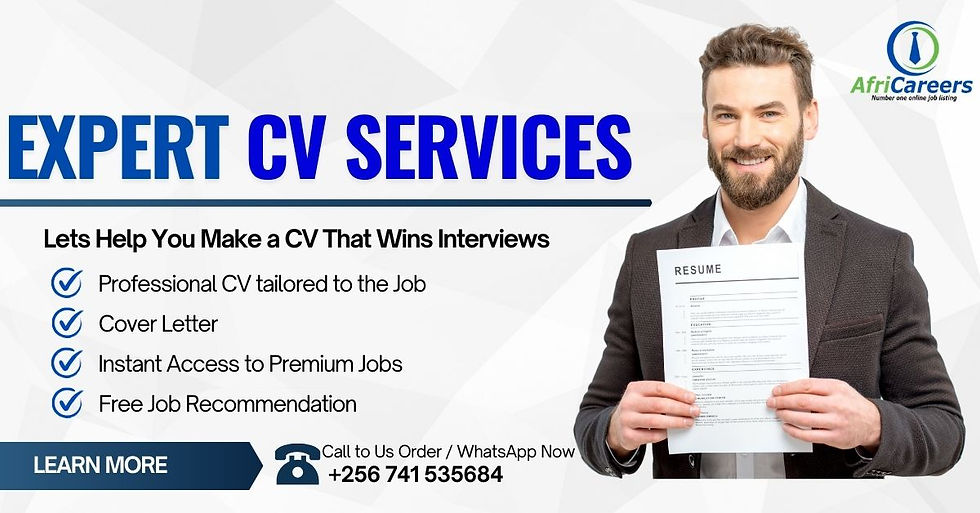Share this Job
Lecturer-Visual Impairment job at Kyambogo University | Apply Now
Are you looking for Teaching Jobs in Uganda 2024? If yes, then you might be interested in Lecturer-Visual Impairment job at Kyambogo University
Kampala, Uganda
Full-time
Deadline:
5 Apr 2024
About the Organisation
The University that now sits on Banda Hill is one of Uganda’s largest public Universities established by the Universities and Other Tertiary Institutions Act 2001 and the Universities and Other Tertiary institutions (Establishment of Kyambogo University) instruments of 2003. It is a merger of the former Uganda Polytechnic Kyambogo (UPK), the Institute of Teacher Education, Kyambogo (ITEK), and the Uganda National Institute of Special Education (UNISE).
Job Title
Lecturer-Visual Impairment job at Kyambogo University
Job Description
Kyambogo University is the second largest Public University in Uganda. Since its formation in 2003, the University has established itself as one of the leading Universities in Uganda offering a number of academic programmes in line with vocational education, teacher training, hands-on engineering, special needs training, social sciences, pure and applied sciences, entrepreneurship and management that meet the market demands and development needs of the Country. The Strategic Focus Areas of the University include: Teaching and Learning: Research, Innovation and Knowledge Generation; Physical frastructure, Facilities and ICT Development, Institutional development and Strategic Marketing.
In order to achieve its mission and strategic goals, the University invites applications from suitably qualified persons to fill the Teaching positions in the disciplines listed hereunder on permanent terms.
Duties and Responsibilities
Curriculum Development: Develop and update courses in visual impairment and special education at both undergraduate and graduate levels. This includes designing syllabi, selecting textbooks, and creating instructional materials tailored to the needs of students with visual impairments.
Classroom Instruction: Deliver lectures, facilitate discussions, and conduct hands-on activities related to visual impairment, including topics such as braille literacy, assistive technology, orientation and mobility, and inclusive education practices.
Supervision and Advising: Provide guidance and mentorship to students pursuing degrees or certifications in visual impairment or special education. This may involve advising on coursework, practicum experiences, and career opportunities in the field.
Research and Scholarship: Engage in scholarly research aimed at advancing knowledge and practice in the education of individuals with visual impairments. This may involve conducting empirical studies, literature reviews, and program evaluations related to effective instructional strategies, assessment practices, and interventions.
Grant Writing: Seek external funding opportunities to support research projects, program development, and community outreach initiatives in the field of visual impairment. This may include writing grant proposals, collaborating with interdisciplinary teams, and managing grant-funded projects.
Community Engagement: Collaborate with schools, agencies, and organizations serving individuals with visual impairments to promote partnerships, professional development opportunities, and outreach initiatives. This may involve delivering workshops, providing consultation services, and participating in advocacy efforts.
Professional Development: Stay informed about current trends, research findings, and best practices in the field of visual impairment and special education. Attend conferences, workshops, and professional development activities to enhance knowledge and skills.

SERVICES
COMMERCIAL

SERVICES
INDUSTRIAL

SERVICES
RESIDENTIAL

SERVICES
COMMERCIAL

SERVICES
INDUSTRIAL

SERVICES
RESIDENTIAL

SERVICES
COMMERCIAL

SERVICES
COMMERCIAL

SERVICES
COMMERCIAL

SERVICES
COMMERCIAL

SERVICES
INDUSTRIAL

SERVICES
RESIDENTIAL
Qualifications and Competencies
Education: A minimum of a master's degree in special education with a specialization in visual impairment or blindness is typically required for a lecturer position. Some institutions may prefer candidates with a doctoral degree (Ph.D. or Ed.D.) in special education or a related field.
Teaching Experience: Demonstrated excellence in teaching special education courses, particularly those focused on visual impairment or blindness, at the college or university level. Experience with diverse student populations and instructional settings is valued.
Certification/Licensure: Some institutions may require or prefer candidates to hold certification or licensure in special education, particularly in the area of visual impairment or blindness. Certification from relevant professional organizations, such as the Council for Exceptional Children (CEC), may also be beneficial.
Research Expertise: Strong research skills and a record of scholarly productivity in the field of special education, with a focus on visual impairment. This may include publications in peer-reviewed journals, presentations at conferences, and involvement in research projects.
Practical Experience: Experience working directly with individuals who are blind or visually impaired, either in educational or rehabilitation settings, is highly desirable. Practical experience provides valuable insights into the needs and challenges faced by individuals with visual impairments.
Communication Skills: Excellent communication skills, both oral and written, to effectively convey complex concepts and engage with students, colleagues, and community stakeholders. The ability to communicate in alternative formats, such as braille or tactile graphics, is advantageous.
Collaboration and Teamwork: Ability to collaborate effectively with colleagues, students, families, and community partners to achieve common goals in teaching, research, and service. Collaboration is essential for addressing the multifaceted needs of individuals with visual impairments.
Commitment to Diversity and Inclusion: Commitment to fostering diversity, equity, and inclusion in teaching, research, and service activities. Ability to create inclusive learning environments that respect and value the diverse backgrounds and experiences of students with visual impairments.
Technology Proficiency: Familiarity with assistive technologies and adaptive devices used by individuals with visual impairments, as well as instructional technologies and online learning platforms commonly used in higher education.
Passion for Special Education: A genuine passion for working with individuals with disabilities and a commitment to promoting their educational success, independence, and well-being.
How to Apply
APPLICATION FOR THIS POSITION MUST BE DONE ONLINE:
Email: dhrkyu@kyu.ac.ug






.png)
.png)
%20(1).jpg)